The Genesis of Dune: Frank Herbert’s Journey to Sci-Fi Immortality
Frank Herbert – a name that echoes through the halls of science fiction like a mystical incantation. But how did this literary sorcerer conjure the epic Dune saga? Strap in, gentlemen, as we kick off this interstellar ride right from the genesis of Herbert’s journey to sci-fi immortality.
The Sparks of Creativity: Early Influences on Frank Herbert
Before becoming the cognoscenti of intergalactic politics, Herbert was a regular Joe, grinding away at odd jobs with nothing but imagination and the boundlessness of post-war America fueling his dreams. The lad who would spawn worlds was, first and foremost, influenced by the shifting sands of his time – the Cold War paranoia, the environmental movements picking up steam, and an increasing distrust in government narratives.
The dunes themselves, which whispered the first inklings of Arrakis, were real – coastal dunes in Oregon, to be precise, where Herbert was researching a magazine article. The story goes that while others saw mere sand, our hero envisioned the epic struggles of a desert planet, and so, Dune began to germinate.
Frank Herbert’s Dune Saga Collection Books
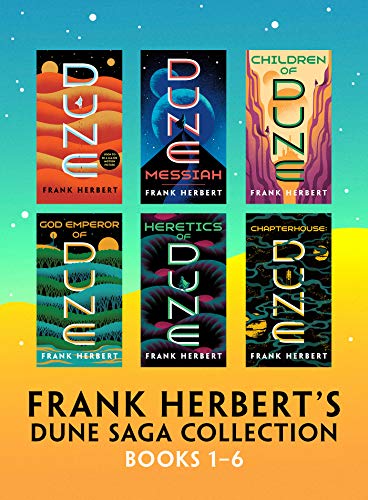
$N/A
Dive into the sprawling, epic universe of Frank Herbert’s Dune Saga with this comprehensive collection that brings together the captivating tales of politics, betrayal, survival, and the human spirit’s indomitable quest for power. This collection invites both longtime enthusiasts and newcomers alike to explore the intricate world of Arrakis, also known as Dune, a desert planet at the heart of a galactic power struggle for control of the rare and valuable spice, melange. Readers will follow the young Paul Atreides as he rises from a noble family’s heir to become the messianic Muad’Dib, shaping the destiny of a vast empire. The series is renowned for its richly detailed setting, complex characters, and thought-provoking commentary on the interplay of religion, politics, ecology, and technology.
Continuing beyond the original novel, “Dune,” this collection showcases Herbert’s ability to expand his universe with stories that delve deeper into the fiefdoms, societies, and intricate ecosystems of the Dune universe. Readers will be enthralled by the sequels including “Dune Messiah,” “Children of Dune,” “God Emperor of Dune,” “Heretics of Dune,” and “Chapterhouse: Dune,” each of which adds layers of complexity to the tapestry of interstellar intrigue and human drama. The saga not only continues the journey of the Atreides family but also introduces new characters and factions, offering widening perspectives on the impact of prescience, the burden of leadership, and the sacrifices made in the name of progress.
Encased in stunning cover art, this collection serves as a testament to the enduring popularity and influence of Herbert’s science fiction masterpiece, ensuring each volume is as visually striking as the story within is compelling. Suitable for display on any bookshelf, the collection makes an attractive acquisition for fans of the genre or those seeking to immerse themselves in a seminal work of speculative fiction. Furthermore, the collection’s inclusion of ancillary glossaries and appendices aids readers in navigating the richly complex terminology and societal structures unique to Herbert’s creation. Enjoy the journey across the dunes of Arrakis and beyond, as the Dune Saga Collection books provide a timeless adventure that will resonate with readers for generations to come.
The Crafting of Dune: An Author’s Ambition and Rigor
Frank tore into the heart of Dune with the vigor of a man possessed. He didn’t just research; he devoured topics ranging from desert ecosystems to Bedouin culture. Talk about a work ethic that’d shame a Wall Street broker! His notes were so exhaustive that they could pretty much qualify as a Ph.D. thesis. And by the time he was done, Herbert hadn’t just written a book; he had engineered an entire world.
Here’s the kicker: despite crafting one of the greatest sci-fi epics of all time, Dune was not a cash cow from the get-go. By 1968 Herbert had pocketed a cool $20,000, a tidy sum for the times but no golden ticket to the writers’ hall of fame. Nevertheless, he pressed on. Interviews with his peers and family paint the picture of a laser-focused Herbert, always with one foot on Arrakis, weaving the threads of his imagination into a legacy.
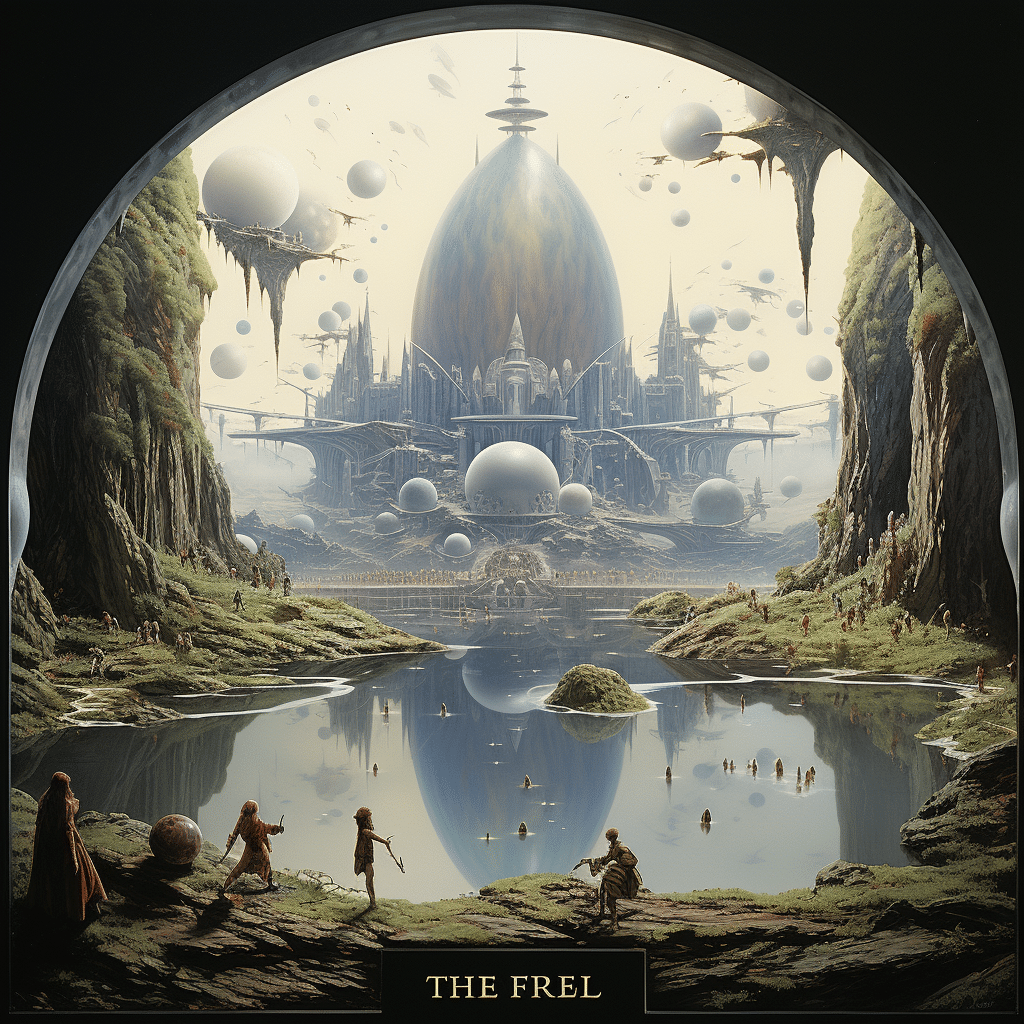
Unraveling the Complexities of Frank Herbert’s Signature World
Frank’s Dune-iverse is as rich and intricate as a billionaire’s wine cellar. Let’s uncork some of this vintage storytelling, shall we?
The Politics of Arrakis: A Reflection of Earthly Affairs
In the rugged terrain of Arrakis, you’ll find a mirror held up to our own world’s messy politics. From feudalistic backstabbings reminiscent of Machiavelli’s finest to an oil-esque dependence on the all-important spice, Dune is more than just sci-fi. It’s a lesson in history with a twist – where sandworms and space travel meet geopolitical chess.
Ecology and Survival: Frank Herbert’s Environmental Prescience
The sand dunes weren’t just shiny backdrops; they were vital nuts and bolts of the Dune machinery. Herbert’s ecological subtleties were cautionary tales, warning of a future marred by environmental neglect. Swap ‘spice’ for ‘oil’, and you’ve got yourself a narrative that hits closer to home than a climate report on the evening news.
The Bene Gesserit and Gender Dynamics: Frank Herbert’s Layered Characters
If you think the Bene Gesserit are just a bunch of space nuns with a neat party trick, think again. Herbert’s women were chess masters in a universe that often played checkers. The portrayal of the Bene Gesserit alone could fuel hours of gender studies debates – and probably has.
Frank Herbert’s Dune Saga Book Boxed Set Dune, Dune Messiah, and Children of Dune
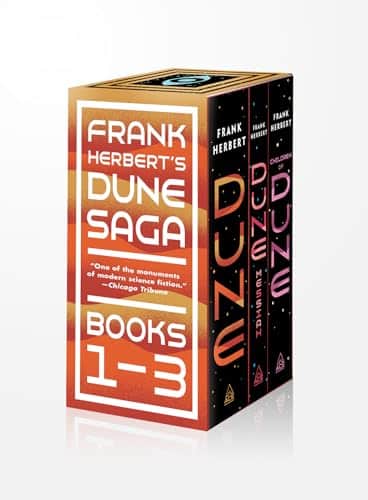
$N/A
Immerse yourself in the expansive universe of Frank Herbert’s celebrated Dune Saga with this beautifully packaged boxed set that includes the first three foundational novels of the series. This boxed set features the legendary science fiction classics: “Dune,” “Dune Messiah,” and “Children of Dune,” inviting both new and returning readers on an unforgettable adventure across the shifting sands of the desert planet Arrakis. With its iconic blend of adventure, mysticism, environmentalism, and politics, Herbert’s opus transports you to a far-future galaxy where noble houses vie for control of the spice melange, the most valuable substance in the cosmos.
Each volume within the set presents a continuation of the intricate story of Paul Atreides, a young noble thrust into the heart of a complex interstellar struggle, and his journey from the son of a ducal house to the prophesied Messiah of a fierce desert people. The first novel, “Dune,” is famed for its rich world-building and complex characters, establishing a tale that investigates the intersection of power, religion, and ecology. “Dune Messiah” delves deeper into the consequences of Paul’s ascent to power, exploring themes of destiny, leadership, and the heavy toll of prophecy, while “Children of Dune” continues the saga with the next generation facing a new set of challenges as they grapple with their legacies.
Crafted with care, the books in this set feature matching covers that capture the evocative and mysterious essence of the Dune universe, making it not only a captivating literary journey but also an attractive addition to any bookshelf. Whether you are looking to revisit the treacherous and intricate politics of the Imperium or discover the depth of Herbert’s vision for the first time, this collector’s set offers the perfect gateway to an epic narrative that has shaped and influenced science fiction for decades. Join the countless fans who have been enthralled by the saga of House Atreides with this essential boxed set of Frank Herbert’s original masterpieces.
| Category | Information |
| Full Name | Frank Patrick Herbert Jr. |
| Born | October 8, 1920 |
| Died | February 11, 1986 (aged 65) |
| Occupation | Novelist, Short Story Writer, Lecturer, Journalist |
| Genre | Science Fiction, Fantasy |
| Notable Works | Dune series |
| First Published Novel | The Dragon in the Sea (1956) |
| Breakout Work | Dune (1965) |
| Initial Earnings for Dune | $20,000 by 1968 |
| Total Books and Collections | Nearly 30 (including six Dune novels) |
| Dune Series Novels | 1. Dune |
| 2. Dune Messiah | |
| 3. Children of Dune | |
| 4. God Emperor of Dune | |
| 5. Heretics of Dune | |
| 6. Chapterhouse: Dune | |
| Philosophical Theme in Dune | Caution against hero worship; self-reliance |
| Last Published Novel | Man of Two Worlds (1986, with son Brian Herbert) |
| Influence | One of the most influential science fiction writers |
| Legacy | Expanded Dune universe through works by son Brian Herbert and Kevin J. Anderson |
| Writing Career Span | 1945–1986 (41 years) |
| Awards | Hugo Award, Nebula Award, Gandalf Grand Master Award, etc. |
The Legacy of Frank Herbert’s Dune in the Sci-Fi Pantheon
Innovative Storytelling: How Dune Redefined the Sci-Fi Genre
In the pantheon of sci-fi, Dune is the Zeus hurling thunderbolts of narrative innovation. Why, you ask? Herbert didn’t just buck trends; he karate-chopped them. We’re talking multiple POVs, epic scale, and a story so layered it makes an onion look straightforward.
Dune’s Influence on Modern Science Fiction and Pop Culture
From dusty bookshelves to the sparkle of Hollywood, Dune’s reach is longer than a sandworm on steroids. It’s in the DNA of Star Wars, a pinch in the recipe for The Matrix, and it’s even inspired real scientific endeavors. And hey, if you’re dressing up in a Starfire costume for that next comic-con, or catching heroes locking horns in Homelander cast, you’re sipping from a cup that Dune filled.
The Dune Phenomenon: Adaptations and the Evolution of Frank Herbert’s Vision
Frank’s vision has been through the Hollywood grinder more than once, kind of like finding the perfect jacket—it’s been tailored time and again. From the trippy ride that is David Lynch’s film to Denis Villeneuve’s recent jaw-dropper, Dune’s adaptability is as legendary as its story.

Beyond Arrakis: Frank Herbert’s Other Literary Contributions
Exploring Other Worlds: Herbert’s Lesser-Known Works
Let’s not forget, Herbert was a veritable factory of worlds, churning out nearly 30 titles, including six in the Dune series alone. And while Dune might be the flagship, the rest of his fleet warrants a good sail too. Books like ‘The Dosadi Experiment’ and his last published novel, ‘Man of Two Worlds’—a quirky collaboration with his son, Brian—all share DNA with those infamous dunes.
Frank Herbert’s Philosophy: Themes Transcending Fiction
Herbert once said, “beware of heroes.” In his tales, you’ll find this strand of philosophy woven in with the finesse of a bespoke suit. His musings on power, ecology, and human nature aren’t just for kicks—they pack a punch with the weight of an eternal truth.
The Future of Dune: Ongoing Relevance and New Horizons
Continuing the Legacy: Brian Herbert and the Expansion of the Dune Universe
Herbert Junior, armed with his father’s notes thicker than a Manhattan phonebook, took up the mantle like a seasoned pro, expanding Arrakis into territories uncharted. These new tales are like cutting a fresh path through an ancient forest – they honor the old while welcoming the new.
Dune in the Digital Age: Interactivity and Fandom
What’s a saga without its heralds? The digital realm has become a spice-laden desert, and the fandom is the colossal sandworm that keeps the legacy pulsating. Online communities dissect every morsel of Herbert’s lore, almost like an intergalactic book club on steroids.
Dune (Dune Chronicles, Book )
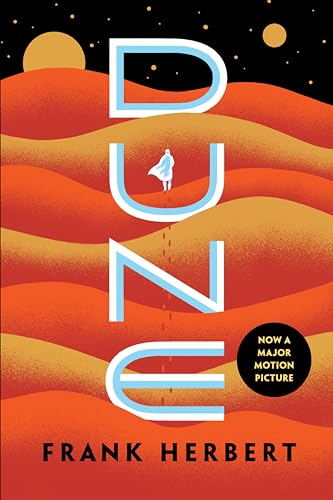
$N/A
Discover the enthralling world of “Dune” from the Dune Chronicles, the first book in the legendary series penned by acclaimed author Frank Herbert. This science fiction masterpiece transports readers to the desert planet of Arrakis, a barren wasteland that holds the key to the future of the known universe. Within its sands lies a valued resource, the spice melange, that extends life, expands consciousness, and enables interstellar travel, making it the most precious substance in existence.
The story follows young Paul Atreides, heir to House Atreides, as he navigates complex political intrigue, ecological challenges, and profound prophecies. Through Paul’s journey, readers are plunged into a richly detailed universe of feudal politics, wherein noble houses vie for power over the spice production that is vital to the cosmos. Herbert weaves a tale that explores themes of survival, power, and the individual’s capacity to influence the destiny of humanity.
“Dune” is not only a thrilling adventure but also a deep exploration of human nature and ecology. Its intricate plot and depth of character have won it global acclaim and a dedicated fan base. The novel stands as a pillar of modern science fiction, having inspired a multitude of adaptations and an enduring legacy that confirms its place among the genre’s most celebrated works.
Conclusion: The Timeless Influence of Frank Herbert’s Dune
As we Vault of Heaven this journey, one thing’s crystal: Frank Herbert’s Dune is as timeless as a classic Rolex. Its themes are evergreen, its influence seismic, and its place in the heart of sci-fi as secure as ever. And just like the finest of scotches, its blend of otherworldly escapades and earthly wisdom is something that’ll never go out of style.

So, what’s the takeaway for the modern man? It’s simple: keep an eye out for the sandworms but never stop chasing the spice. Whether you’re barreling through life like a homelander cast member or catching vibes at Frank Ocean Coachella, remember that to stride through a desert with confidence, you have to be cut from the same cloth as Herbert – ambitious, relentless, and always, always looking beyond the horizon.
Frank Herbert: Mastermind Behind Dune
Let’s dive into the world of Frank Herbert, the genius who took us on an epic journey to the desert planet of Arrakis. From political intrigue to ecological insights, Frank Herbert’s Dune saga is a treasure trove of mind-blowing concepts and unforgettable characters that continue to fascinate readers around the globe.
A Stellar Imagination Unleashed
Frank Herbert wasn’t just another science fiction writer; he was a visionary with a profound understanding of humanity. Much like a good ol’ treasure hunt in the watch night at The museum 2, Herbert’s works take you on an adventure that’s both wildly imaginative and intellectually satisfying.
Along with creating the intricate universe of Dune, Herbert explored themes of survival, power, and ecology. He was ahead of his time, foreseeing environmental challenges that we’re grappling with today. It’s like he had his own crystal ball, predicting how precious resources—uh, much like water on Arrakis—would cause a hullabaloo in the real world.
Research, but Make It Fun
Did you know our boy Frankie wasn’t just a fiction aficionado? Nope, he did some serious legwork while crafting the Dune universe. Herbert was like a sponge, soaking up everything from sand dune formation to religion and philosophy. He researched so hard; it’s rumored his notes could rival the detail in a Fapello—packed with striking features and intricate details!
And yet, Frank Herbert knew how to keep it real; his characters were as fleshed out as his ideas. Each person in his saga, from the messianic Paul Atreides to the sinister Baron Harkonnen, was layered and complex. You know, the kind of folks you’d discuss over a pint—or a spice-infused coffee from Arrakis, perhaps?
An Epic Influence on Pop Culture
If you think the reach of Frank Herbert’s work is limited to the bookshelves of hardcore sci-fi fans, think again. His influence has spilled over into films, TV shows, and even video games. Heck, his work’s more infectious than yawning on a crowded train!
Let’s not forget that stars like Ellen page have been influenced by such epic storytelling. The hero’s journey, a staple of Herbert’s works, resonates in the characters that actors like Page portray—a reflection of the universal struggles we all face.
Financial Savvy in Sci-Fi?
Frankly speaking (see what I did there?), Frank Herbert was not just about creating worlds; he was about understanding the real one. He laid bare the economics of his universe in Dune, which could well give you a run for your money better than checking out Usaa new car loan rates. Control the spice, control the universe—this mantra was all about the Benjamins, baby!
Wrapping It Up with Laughs
Before I zip this section up, let’s not forget Herbert’s sense of humor. Sure, Dune is heavy stuff, but Frankie knew life ain’t worth living without a good chuckle. It wouldn’t surprise me if somewhere between the lines of Dune, there’s a hidden joke that would make albert brooks crack a smile.
There you have it, folks! Frank Herbert, a man whose work is as rich as the spice of Arrakis and as deep as the sandworm burrows. So, next time you pick up a Dune novel, remember, you’re not just jumping into a story; you’re diving headfirst into the legacy of one of science fiction’s most profound thinkers. And that’s no mirage!
Dune
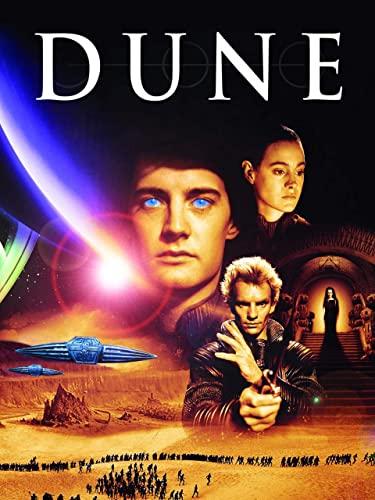
$N/A
“Dune” is a colossal work of science fiction literature by the acclaimed author Frank Herbert. Set in the distant future amidst a vast feudal interstellar society, the novel weaves together intricate themes of politics, religion, and ecology into a profoundly complex and enthralling saga. At the heart of the story is the desert planet of Arrakis, the only source of the universe’s most valuable substance, the spice melange, which grants prolonged life, expanded consciousness, and is critical for space navigation.
The narrative follows the young Paul Atreides, heir to the noble House Atreides, which is thrust into the treacherous political landscape of Arrakis after being granted stewardship of the planet by the Emperor. Surrounded by hostile forces and harsh environmental challenges, Paul’s journey is one of personal and prophetic transformation as he leads a rebellion to seize control of the planet and its resources. His rise intertwines with the fate of the native Fremen, the desert-dwelling people of Arrakis who become integral to his quest for vengeance and justice.
Rich with detailed world-building and complex characters, “Dune” explores the interplay of power, survival, and destiny in a universe where humanity’s potential is boundless. The book has earned its place as a towering achievement in speculative fiction, inspiring a devoted fan base, numerous adaptations, and ongoing literary expansions. Its influence on the genre and pop culture at large is unmistakable, cementing “Dune” as a timeless epic that challenges and captivates its readers with each journey to the sands of Arrakis.
How much money did Frank Herbert make from Dune?
Wow, you’re curious about the cash, huh? Well, determining exactly how much moolah Frank Herbert raked in from “Dune” is a bit like nailing jelly to a wall—tricky! Back in the day, exact figures weren’t as transparent as now. That said, after the mind-blowing success of “Dune,” which snowballed over the years, especially with the film adaptations, it’s safe to say Herbert earned a sand dune’s worth of dough—a few million bucks, at least!
How many Dune books did Frank Herbert write?
Okay, Frank Herbert wasn’t just a one-hit wonder with “Dune”—nope, he was in it for the long haul. He penned a whopping six books in the “Dune” series! He kicked off with the original “Dune” in 1965, and his imaginative mind kept the stories coming until his last one, “Chapterhouse: Dune,” reached readers in 1985.
What is the message of Dune?
The message of “Dune”? That’s like unpacking a chest full of intergalactic goodies! At its core, Herbert’s masterpiece warns us—yeah, you and me—about the dangers of hero worship, blind faith in leaders, and, hold your horses, environmental destruction. It’s like he’s saying, “Folks, keep your eyes peeled and think for yourselves, or we’re all riding the sandworm to doomsday!”
What is the last book Frank Herbert wrote?
The last hoorah from Frank Herbert’s brilliant mind was “Chapterhouse: Dune,” published in 1985. It’s the sixth novel in his “Dune” saga and, whoa, did he leave us hanging! This book is a deep dive that left fans itching for more, though sadly, that was the final chapter from Herbert himself.
Why was Dune controversial?
“Dune” stirred the pot for sure! When it popped onto the scene in the ’60s, it turned heads for its complex themes—like questioning authority, politics as a murky chess game, and environmental crises. Some folks thought these topics were hotter than a Fremen stillsuit in the sun. Plus, let’s not forget the Islamic and Middle Eastern influences that raised more than a few eyebrows in a time when such discussions were more hush-hush.
Was Dune financially successful?
Was “Dune” a giant cash cow? You bet it was—eventually. Frank Herbert’s desert planet wasn’t an overnight sensation, but patience is a virtue, right? After a slow start, word of mouth spread like wildfire, and before you know it, “Dune” became a bestseller. With numerous adaptations, including movies and games, “Dune” has become a golden goose of science fiction.
Why is Dune called Dune?
Always wondered why “Dune” got its name? No rocket science here—it’s named after the ginormous, ever-shifting sand dunes of the desert planet Arrakis, where most of the action unfolds. These aren’t your average sandy beaches, though—these bad boys are massive, treacherous, and home to the giant sandworms. It’s like the Sahara on steroids!
Is Dune hard to read?
Is “Dune” a tough nut to crack? Well, it ain’t exactly “See Spot Run.” Herbert’s epic is stacked with intricate plots, a slew of characters to keep track of, and a lexicon that could make a dictionary blush. But hey, no pain no gain, right? If you’re up for the challenge, “Dune” offers a ride wilder than a sandworm chase!
What makes Dune so good?
What’s the secret sauce in “Dune” that makes it so darn irresistible? It’s like a cosmic buffet of everything you want in sci-fi: political intrigue spicy enough to make your head spin, environmental and religious themes deep enough to drown in, and characters more complex than a Rubik’s Cube. Wrap that up in a universe vaster than space itself, and you’ve got a recipe for an all-time classic!
Where was Dune filmed?
The sands of “Dune” weren’t just literary; they sprang to life on film, too! The awe-inspiring 2021 movie rolled out the red carpet in real-world deserts—primarily in Jordan and the United Arab Emirates. No need for too much CGI when Mother Nature’s got your back with her own stunning, jaw-dropping backdrops!
Is Paul Atreides evil?
Is Paul Atreides a bad apple? Hmm, not quite evil, but the guy’s got layers, like an onion. He starts off as a young lad with a heart of gold, but as the power kicks in and the plot thickens, Paul treads a fine line. Power’s a slippery slope, and he makes us wonder: Is anyone purely good or evil when the stakes are as high as a sandworm’s back?
What is the main problem in Dune?
The main pickle in “Dune”? It’s all about the resource smackdown—control over the spice Melange. This space seasoning is worth more than your grandma’s diamond earrings because it’s the key to space travel, power, and keeping your youth (better than any anti-aging cream!). Everyone from the Emperor to the Fremen wants a piece of the spice pie, making Arrakis the hottest property this side of the Milky Way.
What year is Dune set?
“Dune” cannonballs us way into the future, to the year 10191. It’s a time when humans have scattered across the cosmos, but there’s not a single smartphone in sight—imagine that! Instead, interstellar politics and the struggle for precious resources are the name of the game, and Earth is just a distant memory.
Should I read Dune in chronological order?
To dip your toes into the sands of “Dune,” should you line up the books in chronological order? Nah, you might want to stick with the publication order. Kick off with Frank Herbert’s original “Dune,” and let the saga sweep you along. This way, you’ll get the twists and turns in the order the maestro intended. No spoilers, promise!
What are some fun facts about Frank Herbert?
Looking for some nuggets on Frank Herbert? Well, for starters, the man had gigs ranging from a radio show host to an oyster shucker—talk about a mixed bag! His inspiration for “Dune”? Part of it came from his fascination with the dunes in Oregon. Also, rumor has it he was as stubborn as a mule when it came to his writing—Herbert faced a sandstorm of rejections before “Dune” finally got published. Talk about sticking to your laser guns!

















